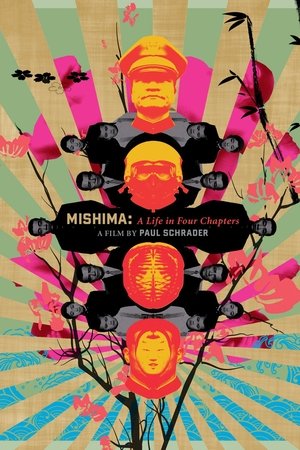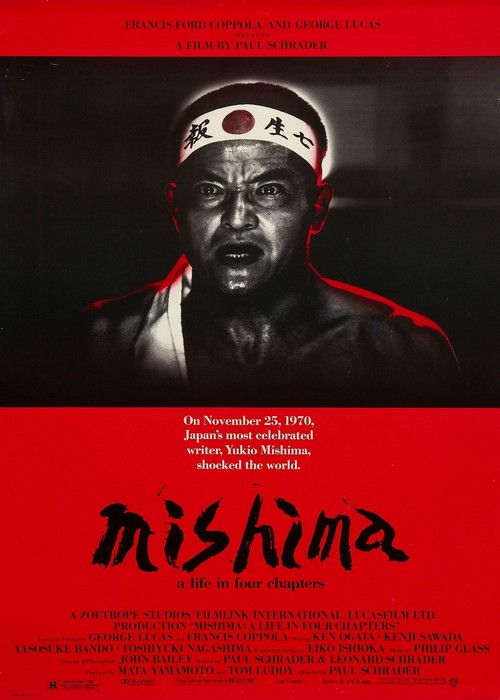Mishima: A Life in Four Chapters

Mishima: A Life in Four Chapters
Overview
A fictional account of the life of Japanese author Yukio Mishima told in four parts. The first three parts relate events in three of his novels: The Temple of the Golden Pavilion, Kyoko's House, and Runaway Horses. The last part depicts the events of 25th November 1970.
Trailer
Cast

Ken Ogata

Gô Rijû
Masato Aizawa

Masayuki Shionoya

Hiroshi Mikami
Junya Fukuda
Shigeto Tachihara

Junkichi Orimoto
Yuki Nagahara
Kyuzo Kobayashi
Yuki Kitazume

Haruko Kato
Yasosuke Bando
Hisako Manda
Naomi Oki

Miki Takakura
Imari Tsujikoichi Sato

Koichi Sato

Kenji Sawada

Reisen Ri

Setsuko Karasuma

Tadanori Yokoo

Yasuaki Kurata
Mitsuru Hirata

Toshiyuki Nagashima

Hiroshi Katsuno
Naoya Makoto
Hiroki Ida

Jun Negami

Ryō Ikebe
Toshio Hosokawa
Hideo Fukuhara
Yosuke Mizuno

Eimei Esumi

Minoru Hodaka
Shôichirô Sakata
Alan Poul
Ren Ebata
Yasuhiro Arai
Fumio Mizushima
Shinji Miura
Yuichi Sato
Sachiko Akagi
Tsutomu Harada
Mami Okamoto
Atsushi Takayama
Kimiko Ito
Kojiro Oka
Tatsuya Hiragaki
Shinichi Nosaka

Sachiko Hidari

Roy Scheider

Chishū Ryū

Naoko Ôtani
Crew

George Lucas

Francis Ford Coppola

Paul Schrader

Paul Schrader

John Bailey

Philip Glass
Michael Chandler

Tom Johnson
Leslie Shatz
Leslie Shatz
Yosuke Mizuno

Tom Luddy

Leonard Schrader

Tomoyo Ōshima

Yukio Mishima

Chieko Schrader
Jun Shiragi
Tom Bellfort

Eiko Ishioka

Eiko Ishioka
Mataichirô Yamamoto
Jerry Ross
Kazuo Takenaka
Etsuko Yagyu
Kyoji Sasaki
Noriyo Ida
Yasuhiro Kawaguchi
Masayuki Okubi
Junji Ota
Gary Clayton
Giorgio Venturoli
Jeff Kliment
Catherine Craig
Play Now Mishima: A Life in Four Chapters / Mishima Movie Online
Taglines: On November 25, 1970, Japan’s greatest author Yukio Mishima commited an act that shocked the literary world…
On November 25, 1970, the writer Yukio Mishima, together with his associates from the Shield Society, went to the base of the ground forces of the Self-Defense Forces in Itigaya. Hardly worried that the rich history of Japan, the history of traditions, rituals, honor of the samurai and religion in the post-war period gave way to the race for money, he intends to urge the soldiers to carry out a coup. On the way, Mishima recalls his life and its influence on his works.
With four like-minded people, he takes the general hostage, demands to build personnel and speaks to the audience with an appeal. However, the writer’s speech is not taken seriously by the soldiers, and Mishima, realizing the hopelessness of the situation, performs the hara-kiri rite.
The film was created under the patronage of Coppola and Lucas, famous followers of the east. The original version is Japanese, despite the fact that it is exclusively a Hollywood movie.
A fictionalized account in four chapters of the life of celebrated Japanese author Yukio Mishima. Three of the segments parallel events in Mishima’s life with his novels (The Temple of the Golden Pavilion, Kyoko’s House, and Runaway Horses), while the fourth depicts the actual events of the 25th Nov. 1970, “The Last Day”.
Creators: Paul Schrader, Leonard Schrader
Director: Paul Schrader
Star Cast: Ken Ogata, Masayuki Shionoya, Hiroshi Mikami
Producer (s): Mataichiro Yamamoto, Tom Luddy
Cinematographer: John Bailey
Music: Philip Glass
Production House: American Zoetrope, Lucasfilm Ltd., M Company, Tristone Entertainment Inc.
Original network / Official Sites: Warner Bros.
Release Year: 20 September 1985 (USA)
Runtime: 122 min
Genres: Biography, Drama
Country: USA, Japan
Language: English, Japanese
Subtitles: English, Bengali
The film sets in on November 25, 1970, the last day in Mishima’s life. He is shown finishing a manuscript. Then, he puts on a uniform he designed for himself and meets with four of his most loyal followers from his private army.
In flashbacks highlighting episodes from his past life, the viewer sees Mishima’s progression from a sickly young boy to one of Japan’s most acclaimed writers of the post-war era (who in adulthood trains himself into the acme of muscular discipline, owing to a morbid and militaristic obsession with masculinity and physical culture). His loathing for the materialism of modern Japan has him turn towards an extremist traditionalism. He sets up his own private army and proclaims the reinstating of the emperor as head of state.
The biographical sections are interwoven with short dramatizations of three of Mishima’s novels: In The Temple of the Golden Pavilion, a stuttering aspirant sets fire to the famous Zen Buddhist temple because he feels inferior at the sight of its beauty. Kyoko’s House depicts the sadomasochistic (and ultimately fatal) relationship between a middle-aged woman and her young lover, who is in her financial debt. In Runaway Horses, a group of young fanatic nationalists fails to overthrow the government, with its leader subsequently committing suicide. Dramatizations, frame story, and flashbacks are segmented into the four chapters of the film’s title, named Beauty, Art, Action, and Harmony of Pen and Sword.
The film culminates in Mishima and his followers taking hostage a General of the Japan Self-Defense Forces. He addresses the garrison’s soldiers, asking them to join him in his struggle to reinstate the Emperor as the nation’s sovereign. His speech is largely ignored and ridiculed. Mishima then returns to the General’s office and commits seppuku.









